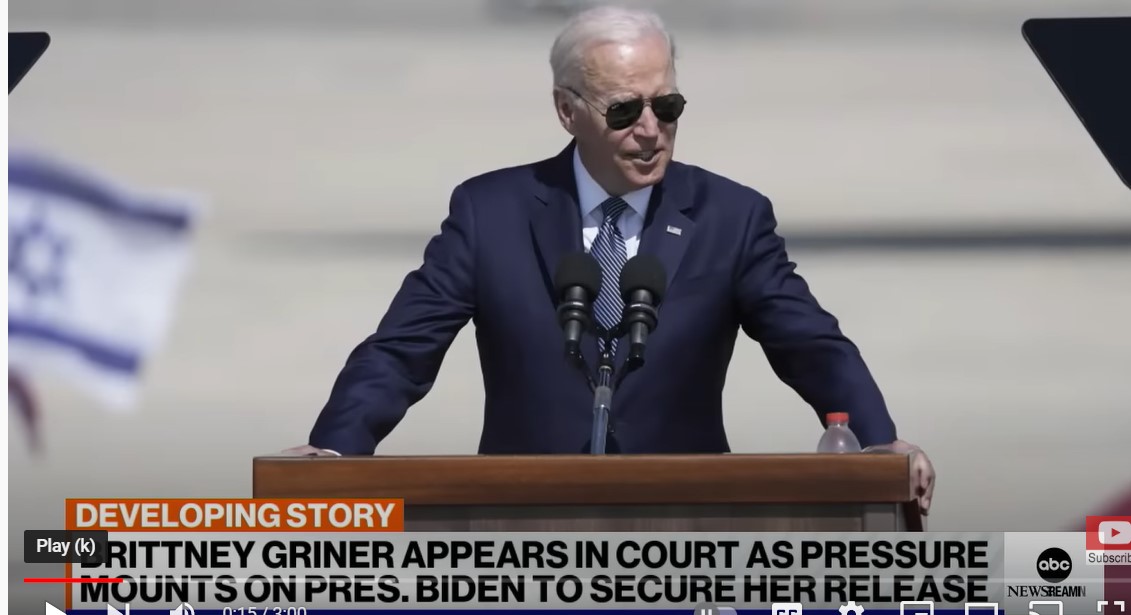Phoenix Mercury player Brittney Griner has been held in a Russian jail since she was arrested in mid-February at Sheremetyevo International Airport after she was found to be carrying vaporizer cartridges containing hash oil, a substance that is illegal in Russia, in her luggage. The Olympic medalist acknowledged in court this month that she did indeed have the canisters.
Some U.S. officials have expressed concern that Russia may be using her as leverage in response to the Western sanctions imposed against Russia for its February 24 Russian invasion of Ukraine. Former Pentagon official Evelyn Farkas has characterized Griner as a “high-profile hostage”.
There have been intense attempts on the part of US lawmakers and diplomats like Democratic Congresswoman Sheila Jackson Lee, to obtain her release, and in early May the US State Department stated that they had determined that Griner was being “wrongfully detained”.

In a transparent move to exploit national sentiment, on the 4th of July Griner sent a letter directly to President Joe Biden, saying, “It hurts thinking about how I usually celebrate this day because freedom means something completely different to me this year”. In a statement released by the White House, Biden offered his support to the Griner family, adding that his administration will “pursue every avenue” to bring Griner back to the United States. On what justifiable basis would the President of the United States intervene on behalf of an individual who has admitted to breaking the laws of another country?
In a closed-door hearing on June 27, a court in Khimki scheduled Griner’s trial to begin on July 1 and extended her detention by six months pending the outcome of her case, according to her lawyer, Alexander Boykov. During the trial on July 7, Griner pleaded guilty and then said, “But there was no intent. I didn’t want to break the law.” As of July 22, 2022, Griner was still in prison and faces up to 10 years detention.
Whether or not the persistent rumors and speculation in Russian and American media are true, that Griner could be exchanged for prominent Russian arms dealer Viktor Bout, who is imprisoned in the United States, they are nevertheless beside the point.
The question here is this: if a foreign national breaks the law of the land while traveling in another country, does it constitute an unlawful detention when they get caught and arrested? Drug possession is illegal in Russia, Griner was caught carrying illegal drugs, whether she intended to break the law or not is completely irrelevant. The principle of ignorance of the law has never been a legitimate defense—whether you’re fighting a parking ticket or murder. The same goes for drug possession.
Does the US let a tourist off the hook if caught breaking its laws? If the answer is no–as it clearly is–then why would we expect that Russia would not enforce its own? The fact that cannabis is legal in this country is equally irrelevant. US laws do not apply in other countries; if you don’t want to accept the consequences, then follow the law of the country that you find yourself in.
There are cases of travelers being arrested and detained where it’s not so clear that they have broken the law. Indeed, there are cases when it’s crystal clear that they have not broken any laws, but that there are other forces at play. In most cases these unlawful arrests are the rogue actions of countries with whom either we have unfriendly relations, or none at all.
It is a surprising fact that, “the vast majority of Americans imprisoned abroad today are held not by terrorist groups, but by foreign governments with whom the U.S. has thorny, or in some cases, no relations. Our government calls them ‘wrongful detainees,’ and there are currently more than 40 of them”.
For example, Daniel Fenster, Detroit native and journalist, had moved to Myanmar in 2019 and worked as an editor for several publications. He and his wife, a Brazilian diplomat named Juliana, got caught up in events when a military junta ousted the elected government of Aung San Suu Kyi, an event that led to peaceful protests in the streets. However, shortly after, the military regime ordered a violent crackdown that drew global attention and condemnation. Daniel Fenster was stopped and arrested at the airport as he was about to board a plane to visit his family in the US. Eventually he was charged with incitement and wrongful association based on his work for a banned publication that had been critical of the military, even though he hadn’t worked there for 10 months.
It took a very public “Bring Danny Home” campaign, global supporters, repeated appeals from the State Department, the dogged interventions of Roger Carstens, the Special Presidential Envoy for Hostage Affairs, and the personal and insistent intervention of U.N. ambassador and former Governor of New Mexico, Bill Richardson to eventually get him released. Fenster had broken no laws. He had been practicing his profession as a journalist and got caught up in a messy political situation that turned him into a bargaining chip by a military junta looking for credibility and political leverage.
Brittney Griner’s is not one those ambiguous cases; she broke a very specific and clear Russian law, drug possession, and acknowledged doing so; she pleaded guilty, and now she should pay the price. Let the US government save its efforts for innocent people who really find themselves victims of political aggression while on foreign soil.












